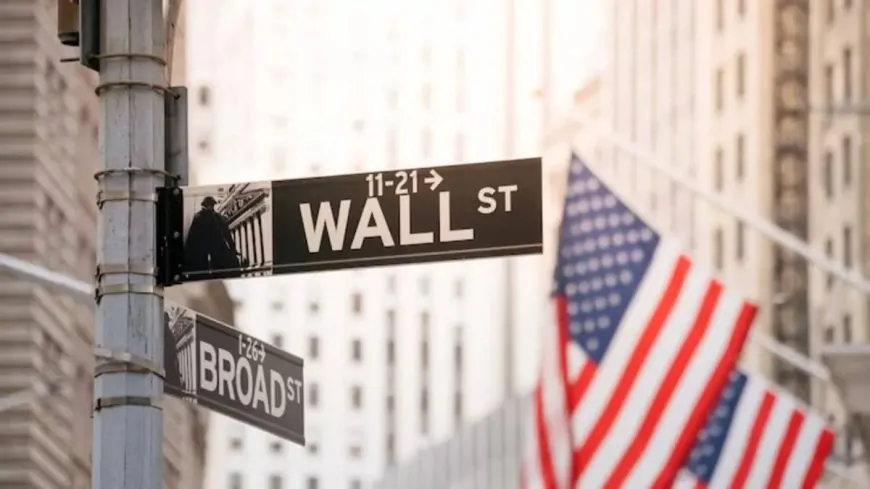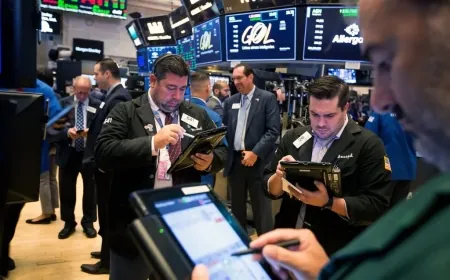Trump’s Fed Criticism Triggers Wall Street Panic: Investors Flee U.S. Markets for Gold and Bitcoin
President Trump’s latest comments on the Federal Reserve have shaken investor confidence, leading to a pullback from U.S. stocks and bonds.

The mood on Wall Street is turning cautious as more investors begin moving money out of U.S. assets—a trend some analysts are calling the “Sell America” shift.
This comes after President Trump launched another round of criticism at Federal Reserve Chair Jerome Powell, questioning the central bank’s handling of interest rates. The remarks triggered uncertainty in the markets at the start of the week, shaking confidence in the U.S. economy and pushing investors to look for safer options.
Markets React Quickly to Rising Political Tensions
Typically, during market stress, investors turn to safe bets like U.S. government bonds and the U.S. dollar. But that didn’t happen this time. Instead, both assets were sold off alongside stocks. The 10-year Treasury yield rose above 4.4%, and the dollar fell to its lowest level in nearly three years.
By Tuesday, there was some small recovery in early trading, but it wasn’t enough to calm nerves. The dollar stayed below a key psychological level, and bond yields remained high—signs that investors are still uneasy.
Gold and Bitcoin Gain as Investors Look for Alternatives
Instead of U.S. bonds or the dollar, investors are moving their money into gold and cryptocurrencies. Gold hit another all-time high on Tuesday, and bitcoin climbed past $89,000. These moves show that many people are looking for places to store their wealth outside of U.S. financial markets.
The reasons go beyond Trump’s latest comments. There are broader concerns about economic growth, rising tariffs, political tension, and how much influence politics could have on the Federal Reserve's decisions.
“This isn’t about giving up on America,” said Ann Berry, founder of Threadneedle Ventures. “But right now, people are more cautious about investing heavily in U.S. assets.”
Big Investors Are Now Focusing More on Global Markets
Recent data shows a noticeable shift in investment flows. U.S. equity ETFs lost $3.6 billion in outflows last week, while foreign markets attracted over $3 billion in new money, according to JPMorgan.
This is significant because international investors play a big role in the U.S. market—they own about one-third of U.S. stocks and over 25% of government debt. Wall Street has always been a symbol of America’s strength, but some of that confidence is starting to fade.
“We’ve always had the advantage of strong institutions and reliable laws,” said Callie Cox of Ritholtz Wealth. “But when those are being questioned, it creates uncertainty for investors.”
Unusual Market Behavior Sparks Worries
In most cases, when both stocks and bonds fall together, it’s because of inflation. But this time, analysts believe it’s more about trust. With so many political and policy-related concerns, even the most loyal foreign investors are starting to hesitate.
“There’s just a lot of uncertainty right now,” said Michael Goosay from Principal Asset Management. “Investors are unsure about the government’s direction, future growth, and inflation risks—all at once.”
Long-Term Outlook Still Has Bright Spots
Despite the current market jitters, some experts still see U.S. assets as strong long-term investments, especially during a possible recession. U.S. bonds, in particular, have historically provided stability when the economy slows down.
Krishna Memani, CIO at Lafayette College, pointed out that while international bonds may perform well in some situations, they haven’t offered the same protection in past U.S. downturns. The U.S. dollar also remains a vital part of global trade.
For now, market volatility is expected to continue as global investors closely monitor what’s happening in the U.S. “This is a moment where the world is watching,” said Vanguard economist Kevin Khang. “People want to know if the U.S. can still be a source of stability.”
Also Read: Apple Gains, Nvidia Drops $230B in Trump Tariff Shake-Up































































